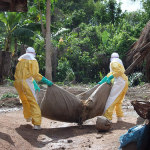Ebola is a new disease in Upper West Africa. Populations have taken time to learn the nature of the risk it poses. Persons carrying infection initially do not know that they have the sickness. They carry out their daily activities, and seek help from their families and traditional remedies when and where they become symptomatic. Nearly all infection, so far as is known, is associated with the “wet” phase of the illness and handling the corpse of a deceased victim. This period of major infection risks extends for 2-3 days either side of death.
Key strategies for preventing further infection are isolation of the patient in an Ebola care facility, “safe burial”, and quarantine of those exposed to Ebola cases. Equally important is social recognition that isolation, safe burial and quarantine are necessary to break the transmission chain. Thus it is important to ask how, and how quickly, communities learn about the risks of infection and the necessity of steps to reduce and eliminate these risks.
Paul Richards / 2015
